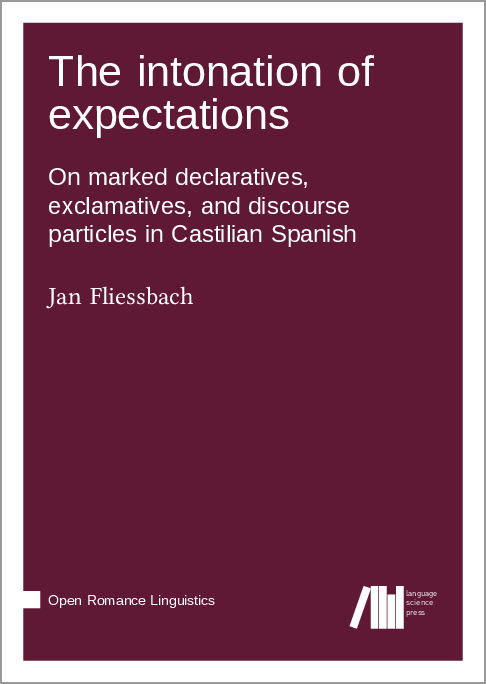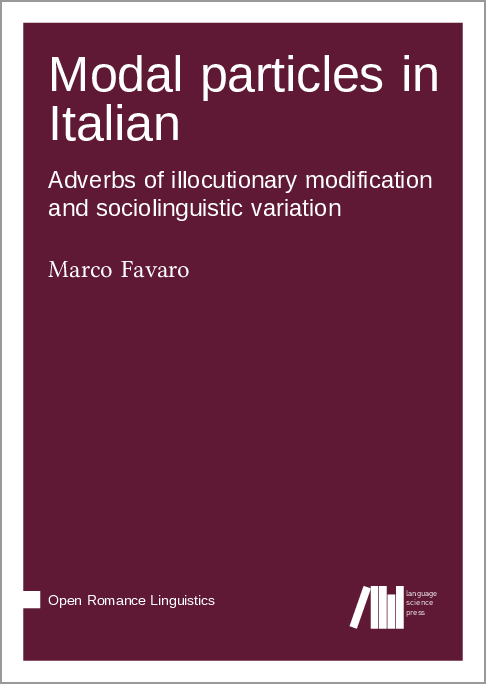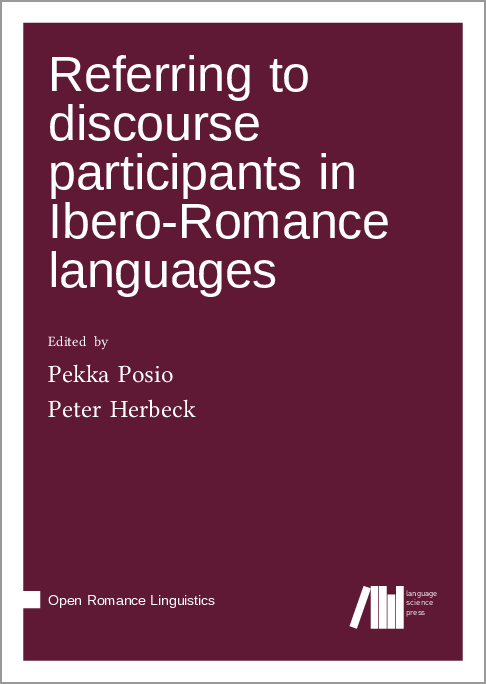In der letzten Zeit sind u.a. diese frei verfügbaren Titel erschienen:
The intonation of expectations: On marked declaratives, exclamatives, and discourse particles in Castilian Spanish
Jan Fliessbach
https://doi.org/10.5281/zenodo.7929375
https://langsci-press.org/catalog/book/387
This book provides a new perspective on prosodically marked declaratives, wh-exclamatives, and discourse particles in the Madrid variety of Spanish. It argues that some marked forms differ from unmarked forms in that they encode modal evaluations of the at-issue meaning. Two epistemic evaluations that can be shown to be encoded by intonation in Spanish are obviousness and mirativity, which present the at-issue meaning as expected and unexpected, respectively. An empirical investigation via a production experiment finds that they are associated with distinct intonational features under constant focus scope, with stances of (dis)agreement showing an impact on obvious declaratives. Wh-exclamatives are found not to differ significantly in intonational marking from neutral declaratives, showing that they need not be miratives. Moreover, we find that intonational marking on different discourse particles in natural dialogue correlates with their meaning contribution without being fully determined by it. In part, these findings quantitatively confirm previous qualitative findings on the meaning of intonational configurations in Madrid Spanish. But they also add new insights on the role intonation plays in the negotiation of commitments and expectations between interlocutors.
Modal particles in Italian: Adverbs of illocutionary modification and sociolinguistic variation
Marco Favaro
https://doi.org/10.5281/zenodo.10259474
https://langsci-press.org/catalog/book/382
This study investigates the properties of a set of Italian adverbs (among others: pure ‘also’, solo ‘only’, un po’ ‘a bit’) that, in specific contexts of use, modify the speech acts in which they appear. On the one hand, these elements specify the way in which a speech act should be interpreted with reference to the specific interactional context, modifying its illocutionary force. On the other hand, they index presupposed/inferred meanings active in the common ground of the interaction, integrating the speech act in the common ground. These functions closely resemble those of the elements that, especially in the German linguistic tradition, are called modal particles. Drawing on original data from Italian – both from the standard language and regional varieties – the goal of the study is to describe the synchronic features of these elements and to explain the emergence of the modal uses. For this purpose, it jointly employs theoretical notions of pragmatics (speech act theory, inferences in interaction), models of language change (reanalysis and conventionalization) and the descriptive tools of sociolinguistic approaches. Through the presentation of four case studies, integrating corpus and questionnaire data, the present work gives a thorough analysis of the modal functions and the contexts of use of the adverbs under investigation: it explores their role at the semantics/pragmatics interface, it discusses their place in a layered model of grammar and it examines their distribution across different language varieties.
Referring to discourse participants in Ibero-Romance languages
Pekka Posio & Peter Herbeck
https://doi.org/10.5281/zenodo.8123675
https://langsci-press.org/catalog/book/376
This volume brings together contributions by researchers focusing on personal pronouns in Ibero-Romance languages, going beyond the well-established variable of expressed vs. non-expressed subjects. While factors such as agreement morphology, topic shift and contrast or emphasis have been argued to account for variable subject expression, several corpus studies on Ibero-Romance languages have shown that the expression of subject pronouns goes beyond these traditionally established factors and is also subject to considerable dialectal variation. One of the factors affecting choice and expression of personal pronouns or other referential devices is whether the construction is used personally or impersonally. The use and emergence of new impersonal constructions, eventually also new (im)personal pronouns, as well as the variation found in the expression of human impersonality in different Ibero-Romance language varieties is another interesting research area that has gained ground in the recent years. In addition to variable subject expression, similar methods and theoretical approaches have been applied to study the expression of objects. Finally, the reference to the addressee(s) using different address pronouns and other address forms is an important field of study that is closely connected to the variable expression of pronouns. The present book sheds light on all these aspects of reference to discourse participants. The volume contains contributions with a strong empirical background and various methods and both written and spoken corpus data from Ibero-Romance languages. The focus on discourse participants highlights the special properties of first and second person referents and the factors affecting them that are often different from the anaphoric third person. The chapters are organized into three thematic sections: (i) Variable expression of subjects and objects, (ii) Between personal and impersonal, and (iii) Reference to the addressee.



